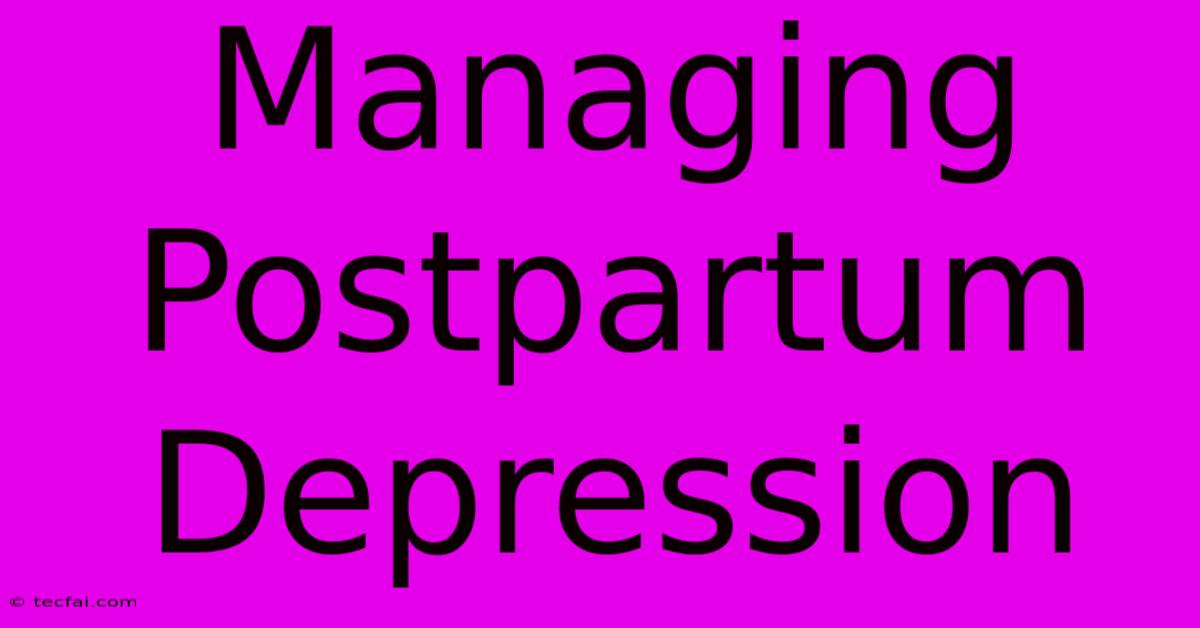Managing Postpartum Depression

Discover more detailed and exciting information on our website. Click the link below to start your adventure: Visit Best Website tecfai.com. Don't miss out!
Table of Contents
Managing Postpartum Depression: A Guide for New Mothers
Postpartum depression (PPD) is a serious condition affecting many new mothers. It's more than just the "baby blues"—it's a debilitating illness that requires understanding, support, and effective management. This comprehensive guide explores the complexities of PPD, offering strategies for coping and seeking help.
Understanding Postpartum Depression
Postpartum depression isn't simply feeling overwhelmed or exhausted after childbirth. While those feelings are common, PPD goes much deeper. It involves persistent sadness, anxiety, and feelings of hopelessness that significantly interfere with daily life and the ability to care for oneself and the baby. Symptoms can vary but often include:
- Persistent sadness or low mood: A feeling that lingers for weeks or months, not just a few days.
- Anxiety and irritability: Feeling constantly on edge, easily frustrated, or experiencing intense worry.
- Loss of interest or pleasure: Finding no joy in activities once enjoyed, including caring for the baby.
- Sleep disturbances: Insomnia or excessive sleeping, impacting energy levels and overall well-being.
- Changes in appetite: Significant weight loss or gain, reflecting altered eating habits.
- Fatigue and lack of energy: Feeling perpetually exhausted, even after adequate sleep.
- Feelings of worthlessness or guilt: Experiencing self-criticism, negative self-image, and overwhelming guilt.
- Difficulty concentrating or making decisions: Struggling with focus and clarity of thought.
- Thoughts of harming oneself or the baby: This is a serious symptom requiring immediate professional help.
Differentiating PPD from the Baby Blues
It's crucial to distinguish PPD from the "baby blues," a milder form of emotional distress experienced by many women after childbirth. Baby blues typically involve mood swings, tearfulness, and anxiety, but these symptoms are generally less severe and resolve within a couple of weeks. PPD, however, persists and intensifies, requiring professional intervention.
Seeking Help and Treatment Options
If you suspect you might have PPD, seeking professional help is crucial. Don't hesitate to reach out to your doctor, midwife, therapist, or a support group. Several effective treatment options are available:
- Therapy: Cognitive Behavioral Therapy (CBT) and interpersonal therapy are particularly effective in managing PPD symptoms. These therapies help identify and challenge negative thought patterns and develop coping mechanisms.
- Medication: Antidepressants can be prescribed to alleviate symptoms, particularly in severe cases. It's essential to discuss medication options with a doctor and carefully monitor side effects.
- Support Groups: Connecting with other mothers experiencing PPD can provide valuable emotional support, reduce feelings of isolation, and offer practical advice.
- Lifestyle Changes: While not a cure, adopting healthy lifestyle choices can positively influence mood. This includes regular exercise, a balanced diet, sufficient sleep, and stress management techniques like mindfulness and yoga.
Supporting a Partner with Postpartum Depression
If your partner is struggling with PPD, your support is invaluable. Learn about the condition, listen empathetically, encourage professional help, and offer practical assistance with childcare and household tasks. Remember to take care of your own well-being as well. Seeking support for yourself can prevent caregiver burnout and ensure you can effectively support your partner.
Creating a Supportive Environment
A supportive environment plays a vital role in managing PPD. This includes:
- Open communication: Encourage honest conversations about feelings and concerns without judgment.
- Shared responsibilities: Distribute childcare and household chores evenly to reduce the burden on the mother.
- Prioritizing self-care: Encourage the mother to engage in activities that promote relaxation and well-being.
- Seeking professional help together: Attending therapy sessions as a couple can strengthen your bond and provide valuable insights.
Postpartum depression is a treatable condition. With appropriate support and intervention, mothers can recover and enjoy a fulfilling relationship with their babies. Don't suffer in silence—seek help and regain your well-being. Remember, you are not alone.

Thank you for visiting our website wich cover about Managing Postpartum Depression. We hope the information provided has been useful to you. Feel free to contact us if you have any questions or need further assistance. See you next time and dont miss to bookmark.
Featured Posts
-
Antiviral And Antimicrobial Coatings 2033
Dec 03, 2024
-
Maternal Health Early Support Needed
Dec 03, 2024
-
The Importance Of Spending Volume And Quality
Dec 03, 2024
-
Local Government Pushes For Youth Funding
Dec 03, 2024
-
Fund Youth Strategy Council Funding Needed
Dec 03, 2024
